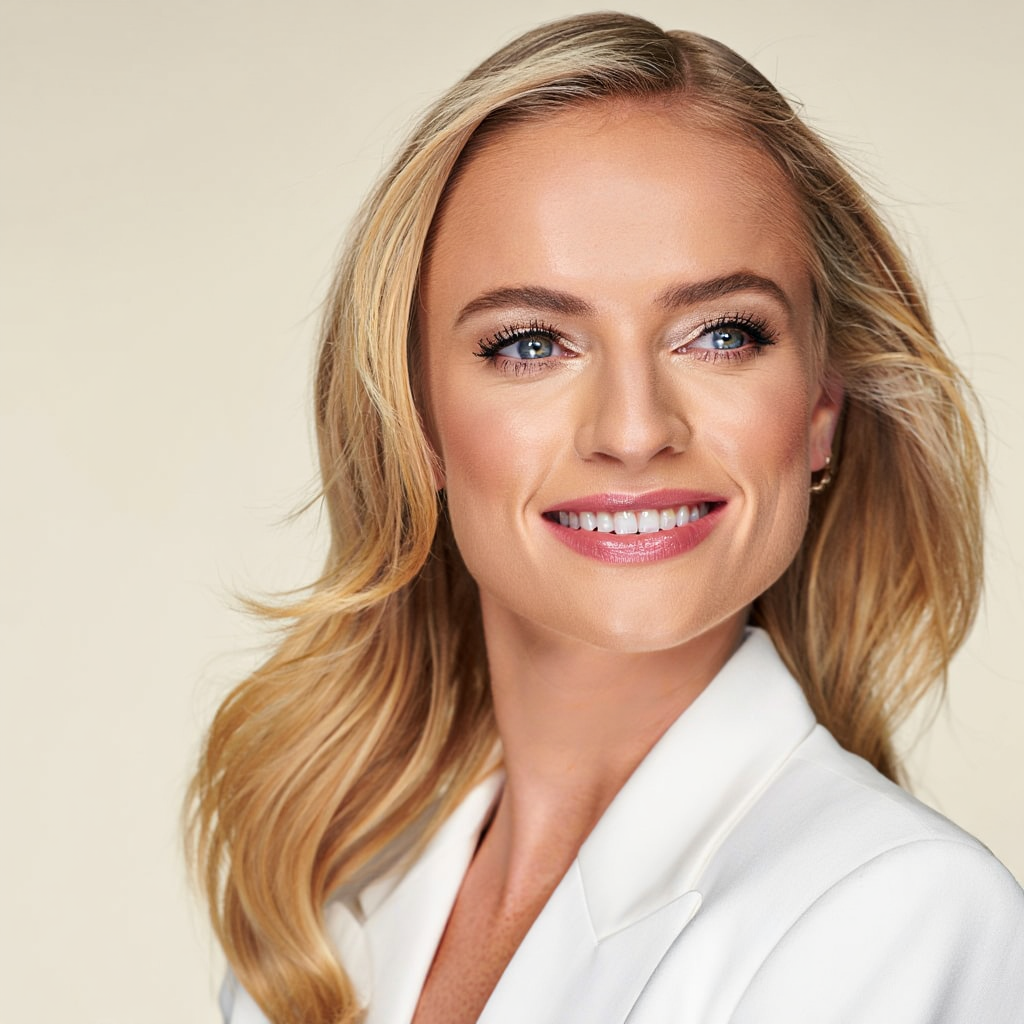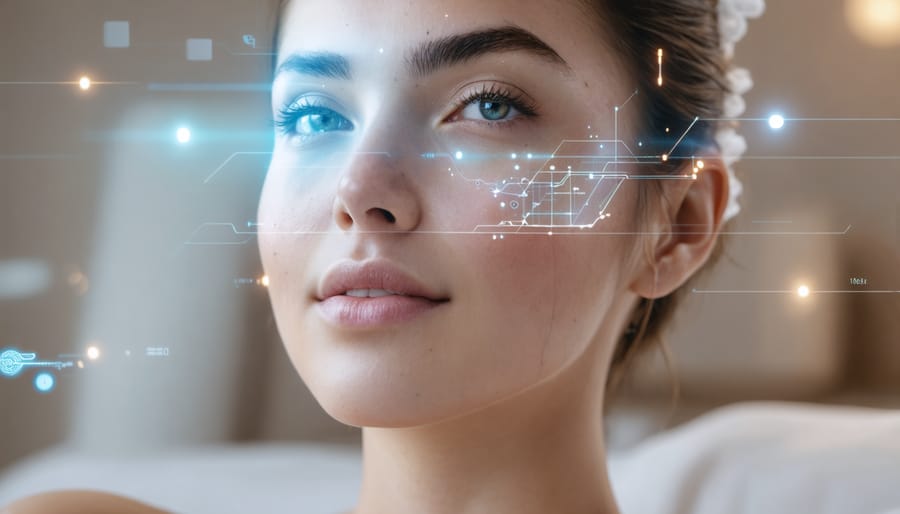No matter whether it is personalized makeup and skincare recommendations or virtual consultations, generative AI provides beauty brands with an innovative way to meet consumer expectations and build loyalty. Gen AI can also aid new product development by analyzing data to predict how different ingredients will react and recommend formula recipes. Furthermore, Gen AI can verify ingredient lists as well as supply chains to detect unethical or environmental sustainability concerns.
1. Personalized Product Recommendations
The beauty landscape is increasingly becoming personalized. From skincare analysis to virtual makeup applications, beauty tools are helping consumers discover products and personalize their beauty routines. These tools can help identify specific skin and hair issues, including wrinkles, acne, and hydration levels. Furthermore, these tools take ethnicity-specific concerns into consideration so brands can provide tailored assistance for consumers.
Some beauty brands take a ‘taker’ approach, integrating off-the-shelf third-party gen AI solutions without much customization into their workflows. This may be suitable for smaller beauty brands with limited consumer data or limited tech talent available.
2. Virtual Try-Ons
Beauty brands are turning to hyper-personalization to build customer trust and reduce product returns. From five-question quizzes designed to identify the ideal moisturizer to AI-powered virtual lipstick testers, consumers expect digital platforms to help them try products before committing financially.
YSL Beauty recently unveiled an online tool that allows consumers to select a makeup shade prior to making a purchase. Such technology is particularly beneficial to e-commerce beauty retailers as it helps increase engagement and conversion rates by eliminating physical samples from customer visits.
Makeup brands use generative AI to generate realistic, high-resolution simulations of their products for customers to “test before you buy.” YSL uses StyleGAN to provide virtual makeup options tailored specifically to customers’ skin tone and desired aesthetic.
3. Personalized Skincare
Generative AI provides beauty brands with exciting opportunities for staying relevant and meeting the tech-savvy consumers’ expectations. Through its visual generation capabilities, generative AI enables personalized experiences tailored to different target groups that resonate well.
Prose, an innovative direct-to-consumer brand, utilizes an automated facial analysis tool that scans customers to assess their skin type and recommend an ideal skincare regime and makeup shades that complement each customer’s complexion. This level of customization is enabled by modular active ingredients which offer increased product formulation flexibility that allow brands to meet varying end market demands while meeting consumer needs more effectively.
4. Automated Image Processing
Beauty brands are using artificial intelligence (AI) to unlock operational efficiencies and drive innovation. From automating inventory management based on real-time demand forecasts to creating more precise formulations, AI helps beauty companies run lean and efficiently while meeting consumer demands for product transparency and sustainability.
From background removal to object detection, artificial intelligence (AI) tools enable beauty brands to show products off in their best light. From content creation and engagement rate increase to consistent customer experiences and increased conversion rates; AI technologies are revolutionizing beauty from within – powered by quality data they enable personalized recommendations, virtual try-ons and more.
5. Predictive Marketing
Beauty AI tools are disrupting the industry in numerous ways, from advanced skin diagnosis and automated inventory management, product quality control and sourcing specialist ingredients; brands who adopt smart solutions will gain an advantage over competitors.
Predictive modeling allows marketers to deliver targeted, relevant content and product recommendations based on future propensities rather than past behavior or innate traits, improving ROI across all channels by targeting customers at the optimal moment. Marketers can gain an edge by accurately anticipating which products will sell well and using that information to maximize upsell and cross-sell opportunities – thereby creating a more tailored customer experience for each one of their customers.
6. Smart Mirrors
Virtual try-on is an invaluable feature in beauty e-commerce, enabling consumers to test products without waste or returning them, increasing conversion rates while simultaneously decreasing waste production – an investment worth making for brands. Image processing technology is revolutionizing how beauty products are displayed online shopping platforms and social media. AI-powered object detection ensures products are properly centered, well-lit, and presented visually appealingly for maximum engagement and purchase intent.
With 30% of consumers seeking personalized skincare solutions, AI-driven tools are meeting this growing need. But in order to maintain consumer trust and avoid challenges of inclusivity and algorithmic bias, beauty tech must address issues of inclusivity and algorithmic bias head on.
7. Automated Scheduling
Artificial intelligence is revolutionizing beauty products and customer experiences alike, from ingredient formulation to sustainability tracking. But brands must remain connected with their consumers and ensure the technology aligns with their values and expectations.
Perfect Corp’s virtual makeup and foundation matching tools can detect nearly 90,000 skin tones allowing e-commerce retailers to provide tailored recommendations suited to customers’ natural coloring. This eliminates trial-and-error processes while freeing beauty experts up for more effective skincare/make-up routine strategies. Generative AI tools like Synthesia make video creation simpler by automating processes such as image cropping and frame positioning – helping beauty marketers create content quickly and more efficiently than ever.
8. Virtual Consultations
As customer expectations for hyperpersonalization increase, beauty brands are turning more frequently to Gen AI technology for hyperpersonalization solutions. From facial and skin diagnostics through live AR virtual try-ons or sophisticated AI multiproduct recommendations, generative AI offers beauty brands an unmatched opportunity to foster meaningful consumer connections while cultivating trust and brand loyalty.
Beauty companies must leverage this potential by building a team of tech talent capable of creating new-generation AI tools and deploying them at scale, while investing in an “AI shaper” approach where third-party gen AI is trained with data from beauty company data sets – this way creating truly transformative experiences.
9. Smart Packaging
Visual appeal is key when selling beauty, which is why AI-powered tools are helping brands streamline and enhance content creation for e-commerce and social media. From background removal to object detection, AI solutions ensure beauty products are presented in their best light for maximum visibility.
AI can also assist beauty brands in maintaining regulatory compliance through ingredient transparency, safety warnings, and label accuracy. By employing optical character recognition (OCR), AI can instantly scan and verify labels to prevent inaccurate information reaching consumers while violating regulations. Likewise, AI monitoring supply chains identifies unethical practices while providing sustainable alternatives.

Pini Sharma is a health and beauty writer who wants to change the way people think about beauty by making it more open and innovative. Pini writes about the latest beauty technology and shares expert makeup tips at savepini.com. She has also spoken out about body positivity in a new and powerful way. Her goal is for everyone to feel good about themselves and express themselves freely.

